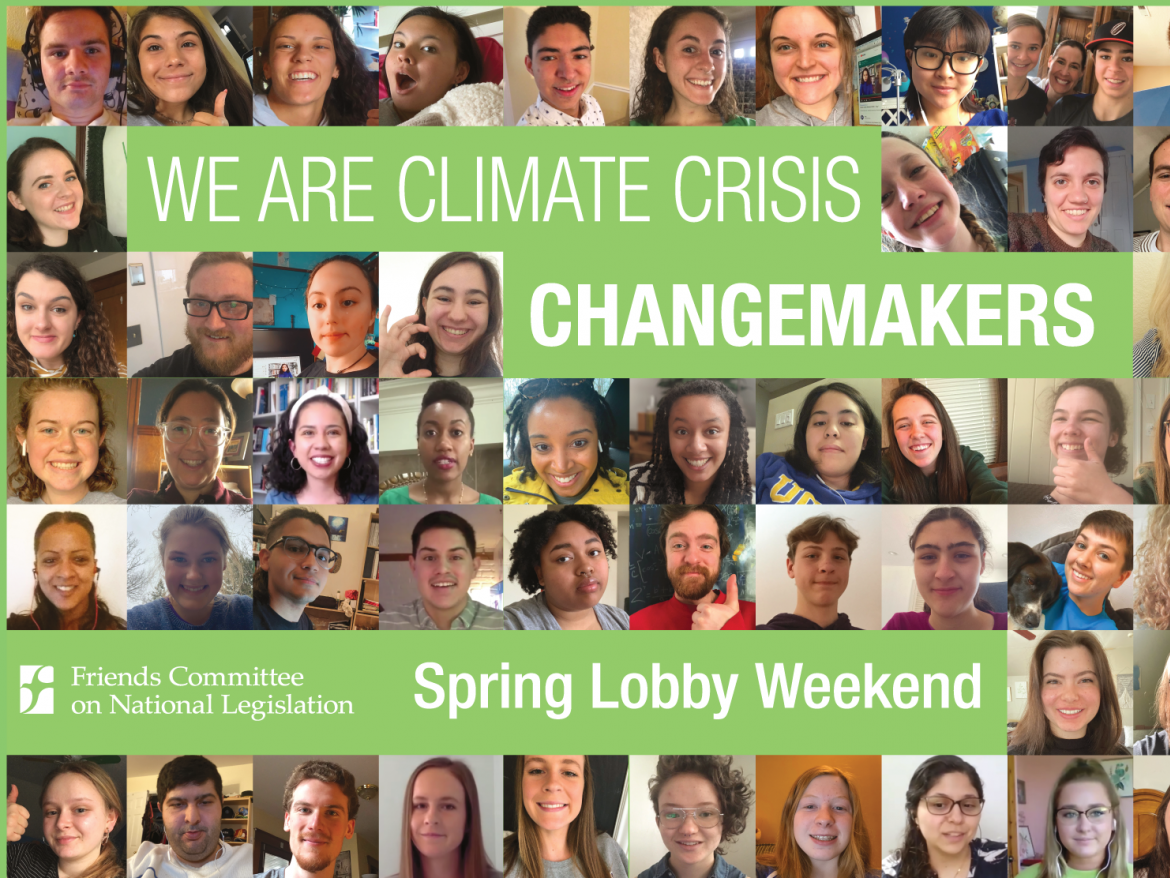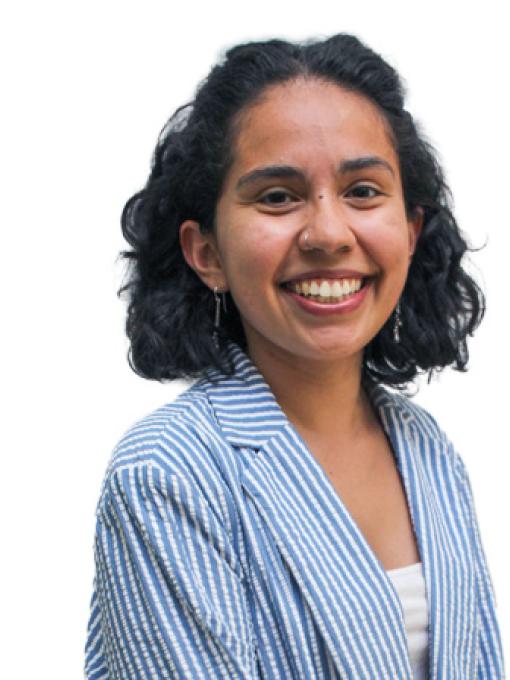In early March, when reports hit that the coronavirus was spreading throughout the country, we knew that FCNL had to shift our 500-person Spring Lobby Weekend from a physical event in Washington, DC, to a virtual gathering.
As FCNL staff, we also knew that the coronavirus impact on the world was both an immediate emergency and a message from the future about the interdependence of the world and the need for Congress to act on climate change. Spring Lobby Weekend 2020 was focused on addressing this crisis.
Ahead of us was an unprecedented challenge. We had spent more than 6 months visiting nearly 60 colleges and organized delegation leaders who were bringing new groups of young people from some 40 states. I had worked extensively with our team of 20 Advocacy Corp organizers to energize their communities to travel to Washington from as far away as Mississippi and Utah.
Our first step was to reach out to the local leaders we have worked with, some of whom have been with FCNL for years. In a series of Zoom calls, the answers came back quickly: “We’re in. We will bring our people to participate.”
We were excited to have a diverse group of participants from all over the country, including communities of color, rural communities, and various faith communities.
We also started talking to producers who could offer advice on how to use our existing technology platforms—Zoom, YouTube, and Facebook Live—to bring people together. What mattered was how we used these technologies to create a sense of community for people logging in from around the country. We invested in improving its production value and rehearsed repeatedly to eliminate bugs in the system.
What mattered was how we used these technologies to create a sense of community for people logging in from around the country.
These consultations gave us the strength to condense three days of programming into two sessions lasting about four hours followed by nine workshops. We were adamant that the virtual Spring Lobby Weekend should not feel like an online class, despite being separated by screens. So we asked: how could we remain connected while being disconnected?
We faced the fact that the climate change message itself was not the easiest to explain in a short amount of time. We had set out to urge lawmakers to put a price on carbon—a step many economists consider the most cost-effective in reducing carbon emissions at the scale and speed necessary for viable change.
FCNL’s young adult team, working with our lobbyists (many of whom are also young adults) transformed the plenary sessions into interactive exchanges and with expert speakers and a member of Congress.
The workshops and questions kept the 500 participants engaged the entire time. But we knew that expert speakers could only go so far, particularly with an audience that was largely tuning in from their living rooms or watching the program on a smart phone. We put together a program that had one or two people from around the country responding to every speaker who talked about climate change, giving our young adults the chance to own this experience
Rachel Cleetus of the Union of Concerned Scientists reminded us of the power of bringing diverse voices to the table and putting pressure on policymakers to respond to the climate crisis. FCNL Advocacy Corps alumna Itzel Perez Hernandez came on the screen from New Jersey to ask her a question.
Alicia Cannon, our program assistant for energy and environment, joined me to talk about why our personal stories and our faith journeys are critical parts of effectively lobbying members of Congress. Young people from Tennessee, Arizona, and Ohio appeared onscreen to tell their own stories.
FCNL’s young adult team transformed the plenary sessions into interactive exchanges with expert speakers and a member of Congress.
After a powerful presentation by Mustafa Santiago Ali of the National Wildlife Federation, Jameelah Lewis, popped up to ask the first question. Lewis is our Advocacy Corp organizer in Las Vegas.
Other questions were asked by young people from Atlanta Friends School, from Quaker colleges and universities, as well as individuals from community organizations and activist groups.
Former FCNL Young Fellow Jamie DeMarco talked about his own journey from sit-ins to lobbying with the Citizen’s Climate Lobby. Current Young Fellow Bobby Trice talked about FCNL’s Quaker approach to advocacy. And we had hundreds of other questions asked on Facebook and YouTube—all of them addressed in real time by co-hosts assigned to those channels.
To underscore the importance of this event, Representative Jimmy Panetta (CA-20) kicked off day two. He thanked the participants for working to build bipartisan support for the carbon pricing legislation that he introduced.
Congressman Panetta’s talk was followed by a panel featuring Democratic and Republican congressional staff talking about the importance of bipartisan action on climate change. They stressed the importance of young people meeting virtually with their congressional staff—even in the middle of a pandemic.
The meetings with members of Congress and their staff were the final part of Spring Lobby Weekend and a key part of the power of our advocacy on Capitol Hill. My colleague Justin Hurdle worked with Bobby Trice to shift the scheduled in-person lobby visits to telephone meetings and then had to secure enough telephone conference lines to make them happen. In consultation with congressional staff, we assembled a new guide to making virtual lobby visits.
Congressional offices were delighted to hear young people talking about the importance of bipartisan action on climate change.
We had 130 lobby visits in all. Congressional members and staff were not only glad to meet, they were particularly appreciative of the planning and structure of these lobby visits as they were also transitioning from in-person work to virtual meetings.
“My favorite part of my entire experience was when we actually got on our calls with our representatives or staffers,” said Ben Trenka of University of Mount Union, Ohio. “It was amazing to have the opportunity to talk about climate change. Also, it was awesome to see how we as constituents could have a pretty typical conversation with our representatives who were willing to listen and ask us questions!”
Again and again, we heard that congressional offices were delighted to hear young people talking about the importance of bipartisan action on climate change. Several of the participants told us this was transformational for them. About 70 percent of the participants to Virtual Spring Lobby Weekend had never lobbied before.
Lobbying Congress by young people is even more important now with COVID-19 and climate crisis. As I said in my final message to participants, “Keep using your voice, keep telling your legislators what you care about, and keep advocating for a better world.”


